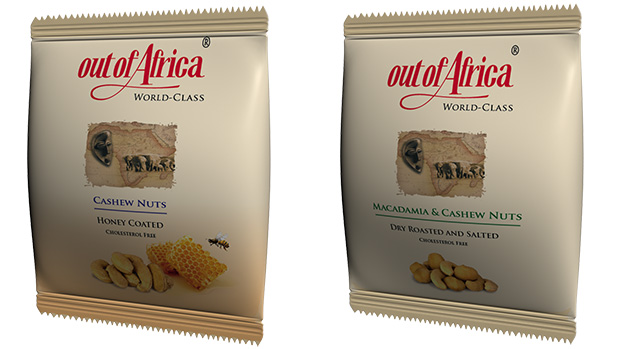ESTABLISHED in 1972, the Kenya Nut Company has become one of the top five global macadamia nut processors. Managing director, Mbugua Ngugi believes that KNC’s success is a result of its unique selling proposition of premium healthy snacks – macadamia and cashews in raw; honey coated; chocolate coated; roasted and salted; and roasted and unsalted versions – sold under the Out of Africa and Nutfields brands at an affordable price, and packaged in gas barrier foil packets to ensure product freshness to consumers at the point of sale.

Mbugua Ngugi, managing director, Kenya Nut Company
Where is KNC located and how big is the company?
The company is located in Thika, an industrial town in Kiambu County, which is 40km (25 miles) north east of the capital, Nairobi. We employ 2,500 skilled personnel in our macadamia and cashew nut processing departments.
Our Out of Africa and Nutfields brands also specialise in coffee, tea and chocolate. Coffee beans and macadamia nuts are complementary crops as they share the same fields and their peak production seasons do not overlap. KNC grows 100% Arabica coffee and macadamia seedlings for our own use and for distribution to out-growers.
What is the distinction between the Out of Africa and Nutfields brands?
We have placed the Out of Africa (OOA) brand in the premium segment of the market with a better product offering in terms of kernel size/grade as opposed to taste. The price also reflects this. For those who are more price-driven, Nutfields offers the same great taste at a more affordable price. Again, the key difference is the nut grade and kernel size.
Another point of difference between the two brands is that OOA does not carry peanuts, as we don’t consider them to be a premium product offering. We recently introduced OOA premium mixed nuts with almonds, macadamias and cashews. Nutfields mixed nuts, on the other hand, contain peanuts, macadamias and cashews.
Aside from these, both brands feature the same packaging materials and are distributed to the same retail outlets.

Macadamia and cashew nuts under the Out of Africa brand are destined for the premium market
How has the demand for organic products in East Africa and globally changed in the past few years? How has this benefited and/or challenged your company?
On the one hand, organic production has put us on the global map because we are one of the only organic commercial production entities in the macadamia sector. While we experience a distinct advantage in the marketing arena, we have been at a significant disadvantage in the production arena as our orchards are not able to compete in terms of volume and quality being produced by conventional farming practices.
Unfortunately, the average pricing module for organic versus conventional does not cover the gaps created in organic farming practices.
How would you describe the nut processing market in Kenya and East Africa?
The nut processing market in East Africa has its challenges. For example, the RCN (cashew in shell) that is locally and regionally grown has traditionally been exported to other countries for further processing. The same scenario has risen for macadamia NIS (nut in shell), even though an export ban from Kenya currently exists for both RCN and NIS.
Whereas Kenya has taken steps through certain policy decisions to increase value-addition in country, this has not been harmonised across East Africa, resulting in huge smuggling challenges.
Similarly, Kenyan law requires all processors and buyers of RCN and NIS to invest in their own resources. This is difficult to ascertain and police, and has given rise to “poaching/free riding”.
This scenario has created an excess capacity in the processing arena and driven up the cost of business as no one is processing to capacity. Additionally, it has caused inefficiency losses in the system with the added consequence of weakening our competitiveness in international markets.
What role do small-scale farmers play in the industry?
The role of small-scale farmers is huge as they still produce 80% of cashews and macadamias. However, because of the skewed RCN and NIS marketplace and the “poaching/free riding” problem, Kenya’s quality is far from industry norms. What we procure from small-scale farmers must go through a rigorous selection process that sees up to 30% wasted and rejected at the farmgate level. This is due to a lack of adequate investment in the industry, especially in education at the primary production level or smallholder.
Without the ability for processors to enter into contractual agreements with small-scale farmers because of a lack of enforcement, smallholders find it difficult to buy quality seedlings to plant, and to get financing to buy agro-chemicals and fertilisers to improve yield and quality.
How much of KNC’s annual output goes to global markets?
Our annual production volume is 9,000 metric tons of macadamias in shell and 5,000 metric tons of cashews in shell. Approximately 30% of this production is distributed locally by value; while the rest is exported to the US, Europe and Asia respectively by volume. We have increased our footprint in the past 12 months by acquiring new customers in all the above-mentioned regions as well as registering good growth from existing customers.
Is the company targeting new markets within Africa?
We are primarily targeting West Africa, specifically Nigeria. We are also looking for entry into the markets in South Africa, Mozambique, Botswana, Namibia and Angola. Although we are currently present in all East African countries, as a company we are looking to expand our ground operations in this region in 2015. Up until now we have had distributors pushing our products in these markets.
How has KNC’s packaging evolved to meet branding/marketing requirements?
Our packaging has changed significantly over the past few years specifically in order to communicate the health benefits associated with our branded products. From a branding and marketing perspective, we aim to position the company as a supplier of premium, healthy, quality products. This has since been captured on our packaging with nutritional tables that specify in detail (per serving size) the calories as well as labelling which highlights that our products are cholesterol-free and dry roasted (without oil). This helps to differentiate our two brands from other snack products within our category.
Are packaging materials sourced locally, and are there any differences in packaging requirements between East Africa and other markets?
KNC traditionally procures all its packaging from Asia, but we are working more and more with local packaging suppliers and printers who are making good strides toward better quality materials. They have also improved their printing capabilities tremendously in the past 10 years.
In our minds, packing requirements are dictated by the need for maintaining product integrity, while on the shelves; at point of sale or at home in the consumer’s pantry. It is imperative that the consumers receive a fresh and tasty product, within the specified shelf life, regardless of whether that packet is being opened in Kenya or in the various export markets we serve.
For our bulk customers, products are generally packed in 11.34kg/25lb nitrogen back flushed and vacuum pulled bags. Our retail sizes range from 20g for nuts to 1kg bags for the grocery sections and off-trade. There are various pack sizes in between with 50g, 80g, 150g and 250g being the main retail sizes.
Where do you source other raw materials and processing equipment?
All of our raw materials are procured locally, except for our chocolate, which is imported from Europe. Most of our production equipment is sourced internationally from original equipment manufacturers that hold service and back-up as a priority within their product offering. To get good quality products on-shelf, we believe in hiring the best personnel and using the best equipment available.
Boardroom connection: Mbugua Ngugi
Position: Managing Director, Kenya Nut Company
A: PO Box 28035 - 00200 Nairobi, Kenya
T: + 254 (20) 224392-6
F: + 254 (20) 217840
E: info@kenyanut.com
W: www.kenyanut.com
Nike Air Jordan
 iConnectHub
iConnectHub
 Login/Register
Login/Register Supplier Login
Supplier Login



























